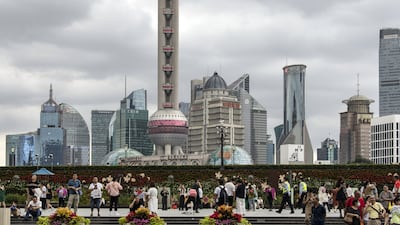The International Monetary Fund has maintained its forecast for the global growth this year but revised it marginally lower for next, saying the world economy is on the path of recovery, however growth remains slow and uneven.
Although the world economy has shown resilience this year, the economic activity still falls short of its pre-pandemic path, especially in emerging market and developing economies and there is divergence within the regions in terms of the pace of recovery, the Washington-based fund said in its latest World Economic Outlook report on Tuesday.
The fund kept its global economic growth projection for this year at 3 per cent, slower than the 3.5 per cent expansion recorded in 2022, remaining below the historical growth average.
For 2024, the IMF expects the global gross domestic product to expand by 2.9 per cent, a 0.1 percentage point downgrade for next year from the fund’s forecast in July.
“In retrospect, the resilience has been remarkable. Despite war-disrupted energy and food markets and unprecedented monetary tightening to combat decades-high inflation, economic activity has slowed but not stalled,” Pierre-Olivier Gourinchas, director of research at the IMF said.
“Even so, growth remains slow and uneven, with widening divergences. The global economy is limping along, not sprinting.”
Despite the success in taming inflation to a degree, the IMF said “it is too soon to take comfort” as China poses a significant risk to the global growth and credit environment remains tight amid elevated interest rates.
With stronger economic activity in the US and inflation dropping from last year’s peak, the world economy “projections are increasingly consistent with a soft-landing scenario: bringing inflation down without a major downturn in activity”, Mr Gourinchas said.
The IMF expects overall growth to be dragged lower by advanced economies, where economic expansion on aggregate is expected to decelerate to 1.5 per cent this year, from 2.6 per cent in 2022.
These economies are likely to grow by 1.4 per cent in 2024.
Performance of advanced economies is underpinned by a “stronger-than-expected US momentum but weaker-than-expected growth in the euro area”, the IMF said.

The world economy is still reeling from the impact of Russia’s continuing war in Ukraine. The conflict that began last year stoked energy prices and disrupted commodities exports, pushing food and energy inflation to record levels in countries highly dependent on food imports.
Although supply chain disruptions are easing, the global growth momentum has slowed amid renewed trade tiffs between the world’s two largest economies – the US and China.
To bring inflation down to their target rates, central banks across the globe are keeping interest rates high, which has further subdued economic momentum in most parts of the world.
The US, the biggest global economy where the Federal Reserve has been increasing interest rates since March last year to bring inflation down from last year's 40-year high, is set to grow 2.1 per cent this year, a 0.3 percentage point revision higher to the IMF’s July prediction.
The US economy, which grew 2.1 per cent last year as well, is expected to expand by 1.5 per cent in 2024.
The euro area, where Germany is already in a mild recession, and the broader economic bloc is grappling with continuing repercussions of Ukraine war and resultant energy crisis, will see further softening of growth.
Slower economic growth is further underpinned by inflation, which hit record levels last year, and the European Central Bank’s bid to keep interest rates at elevated levels to maintain price stability.
Annual inflation across the EU hit a record 9.2 per cent in 2022, compared with 2.9 per cent in 2021.
The IMF expects the bloc to grow by just 0.7 per cent this year, following a 3.5 per cent expansion in 2022.
Germany is now set for a 0.5 per cent contraction in 2023, sharper than 0.3 pencilled in previously for Europe's largest economy.
The IMF projects the UK economy to expand by 0.5 per cent, at a better rate of 0.4 per cent projected in July. Growth in the country is estimated to hit 0.6 per cent in 2024.
Growth in emerging markets will remain sharp this year. On aggregate, GDP in emerging markets will expand by 4 per cent in 2023 and will maintain the same rate of growth next year.
The IMF projects growth in China to hit 5 per cent, slower than the previous 5.2 per cent projection, for 2023. The Chinese economy, which expanded by 3 per cent in 2022, is expected to grow by 4.2 per cent in 2024, a 0.3 percentage point reduction from earlier estimates.
IMF said China’s growth momentum is fading following a Covid-19 reopening surge in early 2023. Growth slowed from 8.9 per cent in the first quarter of 2023 to 4 per cent in the second quarter.
“China’s real-estate crisis could intensify, posing a complex policy challenge. Restoring confidence requires promptly restructuring struggling property developers, preserving financial stability, and addressing the strains in local public finance,” Mr Gourinchas said.
“If China’s real estate prices decline too rapidly, the balance sheets of banks and households will worsen, with the potential for serious financial amplification.”
India, which overtook the UK to become the world's fifth-largest economy in 2022, is expected to be the world’s fastest-growing major economy this year. The pace of GDP expansion is expected to hit 6.3 per cent better than the 6.1 per projected earlier. The Indian economy is expected to maintain the same rate of expansion in 2024.
Growth in the Middle East
Economies in the Middle East and Central Asian region are forecast to grow by 2 per cent, slower than 2.5 per cent expansion previously projected. These economies grew by 5.6 per cent in 2022 and are expected to expand by 3.4 per cent in 2024.
Saudi Arabia, the Arab world’s largest economy, which was the fastest growing major economy globally last year, is forecast to grow by 0.8 per cent in 2023, a downwards revision from 1.9 per cent projection in July, following an 8.7 per cent growth in 2022.
Earlier this month, Saudi Arabia said it expects its economy to contract by 0.03 per cent, underpinned by crude oil production following the Opec+ crude production caps.
Growth in the kingdom is expected to pick up to 4 per cent in 2024, faster than July’s 2.8 per cent projection.
Saudi Arabia, the world's top exporter of oil, benefitted from the rally in crude prices last year.
Oil prices are projected to drop by 16.5 per cent in 2023, with the assumed average price per barrel, based on futures markets at $80.49 in 2023 and $79.92 in 2024, compared with $96.36 in 2022, the IMF said.
World trade growth is also expected to decline to 0.9 per cent this year, from 5.2 per cent in 2022, before rising to 3.5 per cent in 2024, the IMF said.
Global inflation is forecast to decline steadily, from 8.7 per cent in 2022 to 6.9 per cent in 2023 and 5.8 per cent in 2024. But the forecasts for 2023 and 2024 are revised up by 0.1 percentage point and 0.6 percentage point, respectively,
“Core inflation, which excludes food and energy prices, is also projected to decline, albeit more gradually, to 4.5 per cent next year. Most countries aren’t likely to return inflation to target until 2025,” Mr Gourinchas said in a separate blog post.
The IMF said focus should return to the “dimming medium-term outlook” as global growth prospects are weak, especially for emerging market and developing economies.
“The implications are profound: a much slower convergence towards the living standards of advanced economies, reduced fiscal space, increased debt vulnerabilities and exposure to shocks, and diminished opportunities to overcome the scarring from the pandemic and the war,” Mr Gourinchas said.
With lower growth, higher interest rates for longer and reduced fiscal space, structural reforms are key.
“Higher long-term growth can be achieved with a careful sequencing of reforms, starting with those focused on governance, business regulation and the external sector,” he added.










